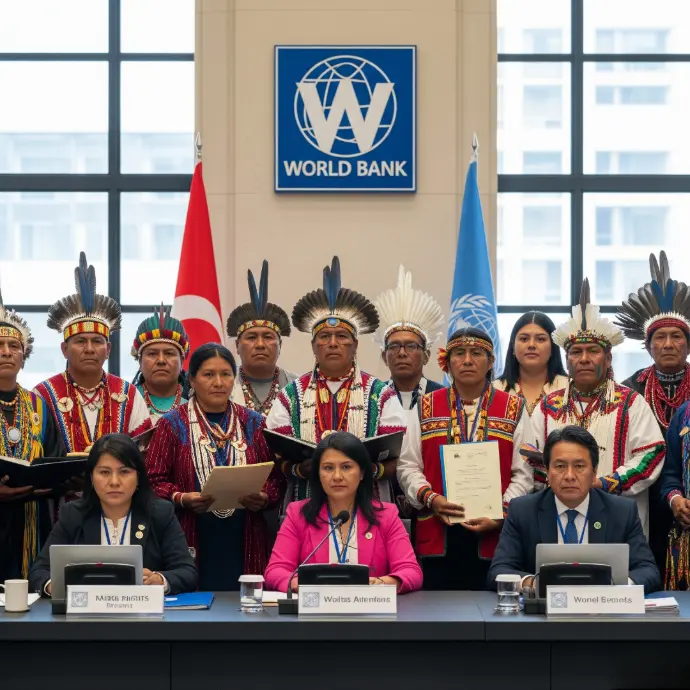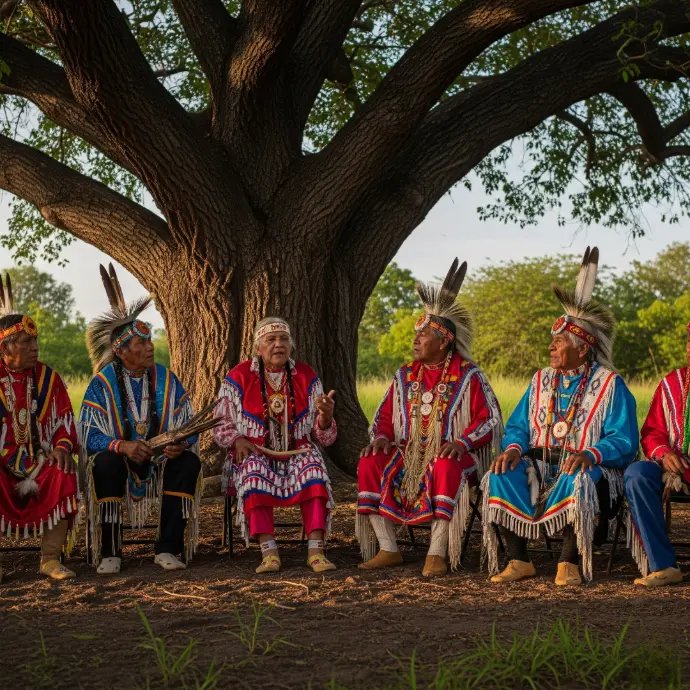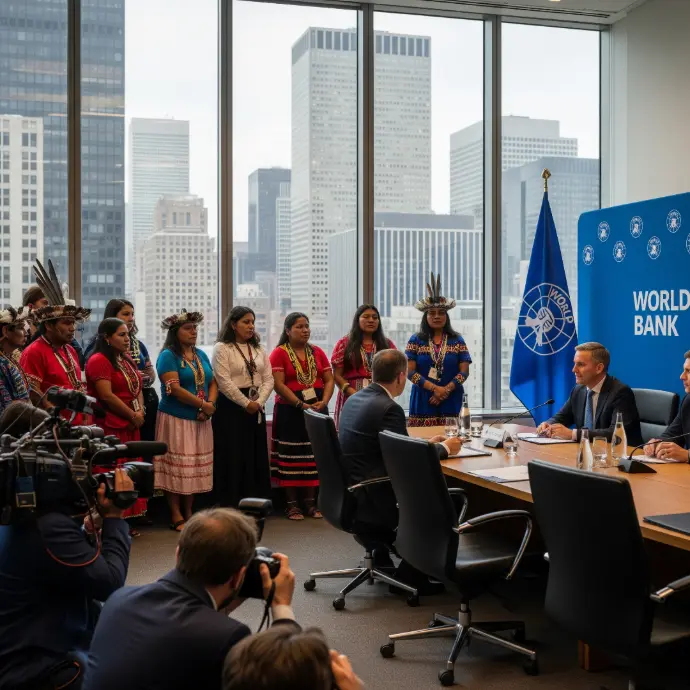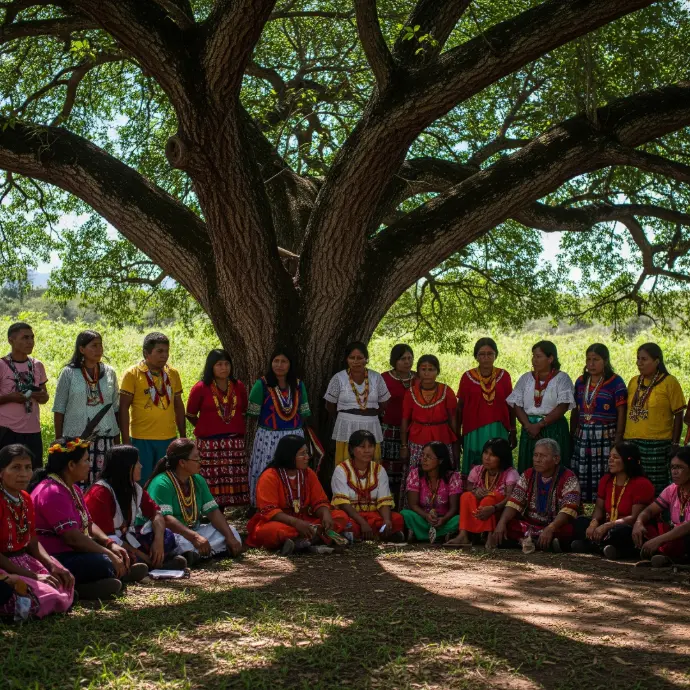In this article, titled "The Role of the World Bank in Projects Impacting Indigenous Communities," we will analyze the impact this institution has had on indigenous communities in the Americas. How have its projects influenced the essence of these cultures? Join us on this journey of discovery and reflection!
Introduction to the Effect of the World Bank on Indigenous Communities
Within the framework of global initiatives to defend indigenous rights, it is crucial to examine the role of the World Bank in projects affecting these communities around the world. Throughout its history, this international financial institution has played an important role in the economic development of several countries, but it has also been criticized for the adverse effects some of its projects have had on indigenous populations.
The World Bank is an international financial organization that provides financial and technical assistance to developing countries with the goal of reducing poverty and promoting sustainable development. Founded in 1944, the World Bank is made up of five institutions, the best known being the International Bank for Reconstruction and Development (IBRD) and the International Development Association (IDA).
The World Bank's primary mission is to combat extreme poverty and promote shared prosperity globally. To achieve this goal, the institution finances projects in areas such as education, health, infrastructure, and rural development in low- and middle-income countries. However, the implementation of some of these projects has sparked controversy regarding their impact on Indigenous communities.
Over the decades, the relationship between the World Bank and Indigenous communities has been complex and, at times, contentious. While the institution has financed programs aimed at improving the living conditions of Indigenous populations, it has also faced criticism for projects that have resulted in forced displacement, loss of ancestral lands, and environmental damage.
One of the main points of contention has been the lack of consultation and prior consent of indigenous communities before the implementation of projects that directly affect them. This situation has generated tensions and conflicts in various regions of the world, where indigenous communities have denounced violations of their territorial, cultural, and environmental rights as a result of World Bank actions.
Relevant World Bank Projects Covering Indigenous Communities
Nuestra empresa se especializa en consultoría, desarrollo de productos y soporte al cliente. Adaptamos nuestros servicios para satisfacer las necesidades únicas de empresas en varios sectores para ayudarles a crecer y tener éxito en un mercado competitivo.
Comuníquese con nuestro equipo de soporte al cliente en info@yourcompany.example.com, llame al +1 555-555-5556 o use el chat que se encuentra en nuestra página web. Nuestro equipo especializado está disponible 24/7 para ayudarle con cualquier consulta o problema.
Estamos comprometidos a proporcionar soluciones rápidas y efectivas para garantizar su satisfacción.
Todos los productos cuentan con una política de devolución de 30 días. Los artículos deben estar en su condición original, sin usar y debe incluir el recibo o la prueba de compra. Los reembolsos se procesan luego de 5-7 días hábiles tras recibir el artículo devuelto.

Relevant World Bank Projects Covering Indigenous Communities
In today's world, indigenous communities face unique challenges that require special attention to ensure their well-being and development. Therefore, the World Bank has been playing a fundamental role in creating and supporting projects that drive significant improvements in their lives. Join us as we explore some of the most relevant initiatives spanning different regions and thematic areas.
The World Bank has focused on promoting the social and economic inclusion of indigenous peoples, combining respect for their culture and ways of life with strategies that promote self-sustainability. These initiatives seek to preserve natural resources, guarantee education, and foster economic opportunities, while maintaining a balance between tradition and progress.
One notable initiative is the Comprehensive Indigenous Development Program, which works directly with local groups to identify their specific needs. This program offers training in sustainable agriculture, environmental stewardship, and resource management, ensuring that communities have the necessary tools to thrive on their own.
Another key project is the World Bank's Indigenous Education Platform. This platform seeks to raise educational levels among Indigenous populations by creating culturally relevant and accessible educational content. It is designed to strengthen traditional skills and incorporate new skills in information and communication technologies.
In addition, the World Bank's community infrastructure projects have significantly improved living conditions by building access roads, providing clean water, and providing electricity, while always considering the ecological impact.
These initiatives are just a sample of the World Bank's work, which continues to innovate and adapt to meet the needs of Indigenous communities, always working with them as true partners on the path toward inclusive and sustainable development.

The World Bank has been involved in financing rural development initiatives in Chiapas, Mexico, with the goal of improving the living conditions of indigenous communities in the region. These projects have covered areas such as sustainable agriculture, access to essential services like health and education, and strengthening local capacities for natural resource management.
One of the main challenges in this project has been ensuring the active and meaningful participation of indigenous communities in all stages of planning and implementation. Consultation and dialogue mechanisms have been established to ensure that the voices and needs of these groups are considered, while respecting their traditions and forms of community organization.
Despite significant progress in terms of economic and social development in the region, challenges persist in the protection of the territorial and cultural rights of indigenous communities. It is essential to continue working on the implementation of measures that guarantee their active participation and respect for their cultural identity.
In the Brazilian Amazon, the World Bank has supported a sustainable natural resource management initiative that seeks to promote responsible land use practices and biodiversity conservation among the region's Indigenous communities. Through this project, training and technical support programs have been implemented to strengthen local capacities in the sustainable management of natural resources.
The initiative has enabled Indigenous communities to access new economic opportunities through the sustainable use of the forest and its resources, while promoting the conservation of the Amazon's rich biodiversity. Collaborative agreements have been established between the various stakeholders, including Indigenous organizations, government institutions, and environmental NGOs, to ensure the protection of Indigenous territories and the sustainable use of natural resources.
Despite the achievements, challenges persist in terms of deforestation, pressure from extractive industries, and the vulnerability of Indigenous communities to climate change. It is crucial to continue supporting initiatives that promote the conservation of the Amazon and the well-being of its Indigenous inhabitants.
The Nam Theun 2 Hydroelectric Project in Laos, partly funded by the World Bank, has involved the resettlement of Indigenous communities affected by the dam's construction. This resettlement process has been one of the most controversial aspects of the project, generating tensions and conflicts with local communities whose traditional ways of life have been disrupted.
While compensation and development measures have been implemented for the resettled communities, there has been criticism regarding the lack of adequate consultation and insufficient participation of Indigenous communities in decision-making that affects their lives. Human rights organizations and Indigenous groups have expressed concern about the negative impact the project has had on the autonomy and culture of these communities.
The case of Nam Theun 2 underscores the importance of ensuring the informed and meaningful participation of Indigenous communities in development projects that may affect their lives and territories. It is essential that the rights and autonomy of these groups be respected, and that their views and needs be taken into account at all stages of planning and implementing projects of this nature.
Impact Assessment on Indigenous Communities
The World Bank has been involved in a variety of projects that have had a significant impact on indigenous communities around the world. According to the World Bank, many of these projects have provided concrete benefits to communities, such as infrastructure improvements, access to essential services like clean water and electricity, and new economic opportunities for local residents.
In addition, some World Bank-supported projects have been documented as contributing to the sustainable development of indigenous communities, promoting environmental conservation and the responsible use of natural resources. These benefits have been recognized by both the World Bank and some indigenous communities that have participated in these projects.
According to official reports, the World Bank has worked closely with various indigenous communities to ensure that project benefits are distributed equitably and that the rights of indigenous peoples are respected during implementation. This collaboration has been key to achieving positive and sustainable results in the affected communities.
Despite the reported benefits, World Bank-supported projects have faced criticism and controversy from indigenous organizations and human rights advocates. It has been argued that in certain cases, the projects have had negative effects on indigenous communities, including land loss, environmental degradation, and violations of indigenous peoples' rights.
Furthermore, the effectiveness of indigenous community participation and consultation in project planning and implementation has been questioned, generating mistrust and tensions in some areas. Some organizations have pointed out that the World Bank needs to improve its safeguards and consultation mechanisms to ensure that projects do not cause irreparable harm to indigenous communities.
The controversies surrounding World Bank-supported projects have highlighted the need to comprehensively address the social, cultural, and environmental impacts of such projects on indigenous communities, as well as to ensure respect for their rights and autonomy.
Evaluating the long-term impacts of World Bank projects on Indigenous communities is critical to understanding the true magnitude of these interventions. Through case studies in various regions of the world, it has been possible to examine how these projects have influenced the culture, economy, and well-being of Indigenous communities over time.
Some studies have indicated that while certain projects have contributed to the short-term economic development of Indigenous communities, they have also had long-term adverse effects, such as the loss of cultural identity, the fragmentation of ancestral territories, and dependence on external resources. These findings emphasize the importance of considering not only the immediate benefits but also the long-term impacts on the autonomy and resilience of Indigenous communities.
The case studies have highlighted the need to adopt a comprehensive and participatory approach to the design and implementation of projects affecting indigenous communities, ensuring the protection of their rights, the preservation of their culture, and the promotion of their sustainable development in harmony with their natural environment.

World Bank Regulations and Safeguards for the Protection of Indigenous Peoples
The World Bank, through its Operational Policy 4.10 on Indigenous Peoples, establishes precise guidelines to ensure the protection of the rights and culture of indigenous communities in the projects it finances. This policy emphasizes the importance of respecting and safeguarding the rights of indigenous peoples, encouraging their active participation in decisions that directly affect them. The World Bank's Operational Policy 4.10 establishes that projects involving indigenous communities must honor their customs, traditions, and governance systems. Furthermore, it is essential to obtain the free, prior, and informed consent of indigenous communities before carrying out any intervention that may impact them. This approach seeks to ensure that projects promote sustainable development and the well-being of indigenous communities without compromising their rights. To comply with the guidelines of Operational Policy 4.10, the World Bank requires countries receiving funding to conduct meaningful consultations with leaders and representatives of indigenous communities. These consultations must be carried out in a transparent and respectful manner, ensuring that communities have the opportunity to express their concerns, needs, and expectations regarding the project in question.
The World Bank implements a rigorous process for assessing and monitoring the impact of its projects on Indigenous communities. Before project approval, a comprehensive assessment is conducted to identify potential risks and adverse effects on Indigenous communities, as well as to design appropriate mitigation measures.
Once a project is implemented, periodic monitoring is conducted to continuously assess its impact on Indigenous communities. The World Bank ensures compliance with the safeguards established in Operational Policy 4.10 and takes immediate corrective action if any non-compliance or unanticipated negative impact is detected.
Furthermore, the World Bank promotes transparency and accountability regarding the impact of its projects on Indigenous communities. Recipient countries are required to regularly report on project progress and results, including how the concerns of indigenous communities have been addressed and the actions taken to ensure their active participation in the process.
The Voice of Indigenous Communities: Responses and Resistance
Dialogue forums between the World Bank and Indigenous communities are essential to facilitate effective communication and ensure that the voices of these communities are heard and taken into account in projects that may affect them. These spaces allow for the exchange of ideas, concerns, and proposals, promoting a more inclusive and participatory approach to decision-making.
It is vital that these forums be established with transparency, respect, and equity, ensuring that Indigenous communities have the opportunity to express their opinions and effectively defend their rights. The creation of these spaces for dialogue contributes to greater mutual understanding, the identification of sustainable solutions, and the strengthening of relations between the World Bank and Indigenous communities.
Furthermore, these forums can serve as mechanisms to monitor and evaluate the impact of World Bank-financed projects on Indigenous communities, ensuring that their rights, culture, and territory are respected. Collaboration in these spaces can generate an environment of trust and cooperation that benefits both parties and promotes sustainable and equitable development.
Collaboration between the World Bank and Indigenous communities has led to notable success stories, where projects have been implemented that have positively and sustainably benefited these communities. These cases demonstrate that, when authentic dialogue is established and the ancestral knowledge of Indigenous communities is respected, it is possible to achieve successful results that promote human development and cultural preservation.
However, there are also challenges in this collaboration, such as the lack of full recognition of Indigenous communities' rights, unequal power in negotiations, and the persistence of conflicts related to the use of natural resources. These challenges underscore the importance of strengthening participation and consultation mechanisms, as well as ensuring the implementation of effective safeguards to protect the rights of Indigenous communities in the context of World Bank-financed projects.
Therefore, it is essential to continue working to build relationships of trust, respect the autonomy of Indigenous communities, and promote sustainable development that considers their needs and aspirations. The collaboration between the World Bank and Indigenous communities represents a unique opportunity to advance toward a more inclusive, equitable, and respectful future of cultural and environmental diversity.

The Future of the World Bank's Impact on Indigenous Communities
The World Bank has been involved in a variety of projects that directly affect Indigenous communities around the world. Currently, there is a shift toward more sustainable approaches that respect the rights of these communities. The active inclusion of Indigenous peoples in the planning and implementation of projects that concern them is increasingly sought, ensuring the preservation of their cultural identity and the protection of their territories.
It is crucial that future World Bank-led projects focus on strengthening both environmental and social sustainability, as well as promoting respect for the rights of Indigenous peoples. Consultation and free, prior, and informed consent mechanisms are expected to be implemented, in accordance with international standards, to ensure that decisions made respect the self-determination and autonomy of these communities.
Furthermore, the World Bank is expected to continue improving its internal policies and practices to ensure that its actions not only benefit local economies but also protect and promote the rights of Indigenous peoples, thereby contributing to the preservation of cultural diversity and the empowerment of these communities.
The international community and human rights organizations play a crucial role in protecting the rights of Indigenous peoples from projects that may affect their territories and ways of life. Through awareness-raising, diplomatic pressure, and active advocacy for Indigenous rights, these entities can help ensure that decisions made at the global level respect the self-determination and dignity of these communities.
Human rights organizations play a fundamental role in monitoring projects financed by institutions like the World Bank, ensuring that international human rights standards are respected and that the rights of Indigenous peoples are protected at all times. Their advocacy and reporting work is essential to highlighting the problems these communities face and advocating for fair and equitable solutions.
In this sense, close collaboration between the international community, human rights organizations, and Indigenous communities themselves is essential to ensure that future projects respect cultural diversity, promote inclusion, and contribute to the sustainable development of all peoples, in harmony with nature and respect for fundamental human rights.

Conclusions
The World Bank's role in projects impacting Indigenous communities is a multifaceted issue that requires a careful balance between economic development and the protection of these communities' rights. Although infrastructure and development projects can offer valuable opportunities, it is essential that their traditions, territories, and ways of life be respected.
It is crucial that decisions by the World Bank and other international financial institutions consider the potential impact they may have on Indigenous communities. Mechanisms for consultation and free, prior, and informed consent must be established to ensure that the voices of these communities are heard and taken into account at all times.
In this context, it is essential to foster open and transparent dialogue among all stakeholders, prioritizing inclusion and mutual respect. Only through a collaborative and respectful approach can sustainable development be achieved that benefits all stakeholders, without compromising the protection of Indigenous rights and culture.
Ultimately, it is vital to find the right balance between economic development and the protection of Indigenous rights. While progress and modernization can bring benefits, it is critical that these not be achieved at the expense of Indigenous communities and their way of life. It is the responsibility of all stakeholders involved to ensure that any project respects the rights and culture of these communities.
It is necessary to promote greater awareness of the needs and challenges faced by Indigenous communities, as well as to implement policies and practices that ensure their active participation in any development process that directly affects them. Only through an inclusive and respectful approach can sustainable and equitable development be achieved for all.
The balance between development and the protection of Indigenous rights is a constant challenge that requires genuine commitment from all stakeholders. Only through a collaborative and empathetic approach can a just and sustainable future be guaranteed for Indigenous communities around the world.
To achieve effective collaboration between the World Bank and Indigenous communities, it is essential to establish clear and transparent communication channels that allow for open and respectful dialogue. Spaces for consultation and active community participation must be promoted at all stages of projects, from planning to implementation and monitoring.
Furthermore, the World Bank must ensure respect for Indigenous rights in all its operations, ensuring compliance with international standards regarding consultation, consent, and environmental and social safeguards. Effective mechanisms for accountability and monitoring of project impacts on Indigenous communities must be implemented.
Finally, it is essential to promote training and awareness-raising within the World Bank and other financial institutions on the importance of respecting the rights and culture of Indigenous communities. Only through an approach based on respect, equity, and inclusion can authentic collaboration that benefits all parties involved be achieved.

 IHRO NEWS
IHRO NEWS